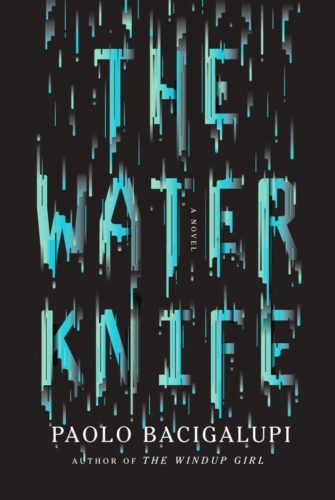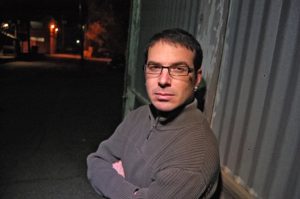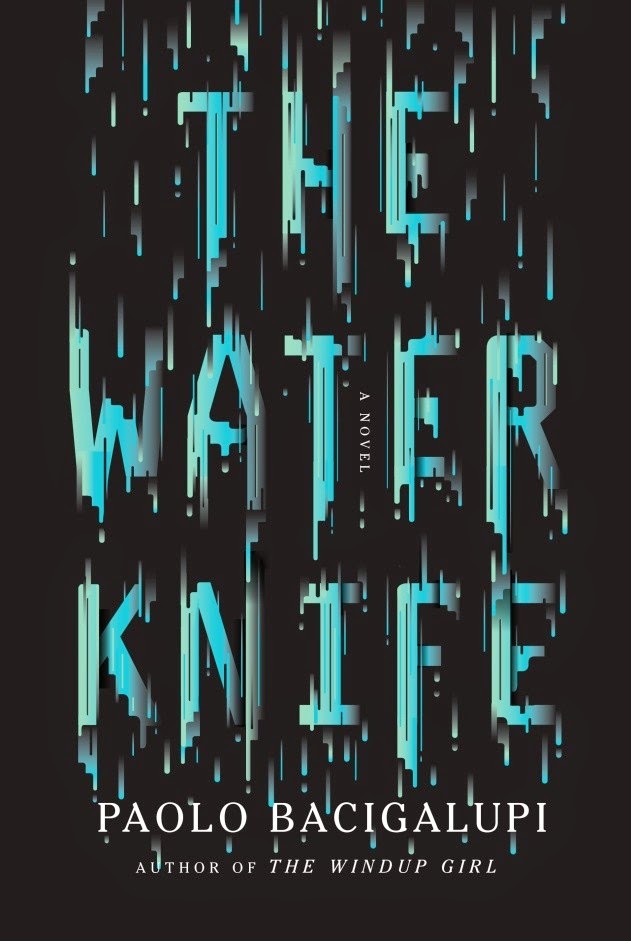Writers Read: The Water Knife by Paolo Bacigalupi
 “Somebody’s got to bleed if anybody’s going to drink” (164).
“Somebody’s got to bleed if anybody’s going to drink” (164).
In his climate-fiction (cli-fi) novel, The Water Knife, Paolo Bacigalupi’s cinematic writing begs to find its way to the big screen where his vast landscapes, dramatic dialogue, and poignant message on water consumption can reach the masses. While his story lands big, juicy punches, Baciglupi’s keen storytelling skills render his message in an authentic manner, avoiding didactic rhetoric. The Water Knife takes us on an action-packed ride that leaves the reader questioning their values and wondering if it’s already too late to change their impactful habits.
The Water Knife is set in the desolate, near-future desert landscape of Arizona. The powers that be are fighting for control over the water reserves of the Colorado River. Border walls have been constructed around state lines in an attempt to control remaining natural water resources and keep the masses from migrating to more verdant parts. Enter Angel Velasquez, A.K.A. The Water Knife. Angel is employed by Catherine Case, the leader of the Southern Nevada Water Authority (SNWA). Velasquez is a secret operative tasked with cutting off access to the reserves with no regard for the millions of lives that rely on them for survival. He is an ex-con trained to injure without emotion. Enter Angel’s counterpart, tough Pulitzer-winning journalist, Lucy Monroe. Lucy is searching for answers. She wants to know why the water is drying up in some territories of the southwest, but still flowing freely in other parts of the country. Soon they team up with a young Texan migrant named Maira who holds a vital key to the SNWA’s resource grab—original documents proving ownership of the water rights by the area’s indigenous native tribes. Along with former home-builder-turned-pupusa-vendor, Toomie, the four set out to fight the evil water cartel that wants to keep the truth of ownership buried.
Bacigalupi’s novel explores the underground of a society on the brink of extinction. He employs graphic violence, sexual situations, and torture to take his readers into uncomfortable territory.
Aware of our limited natural resources, we still chose, day in and day out, to ignore the signs that we are hurting the environment that sustains us.
In his protagonist, Angel, Baigalupi creates a flawed man torn between his desire to earn Catherine Case’s respect for his professional abilities and Lucy’s respect for his humanity. Angel’s internal conflict personifies our society’s current situation. Aware of our limited natural resources, we still chose, day in and day out, to ignore the signs that we are hurting the environment that sustains us. The Water Knife reminds us that only we can save ourselves and Bacigalupi’s excellent craft forces us to examine our complicity.
In a poignant exchange between Lucy and Angel, he writes, “It’s not the lies. It’s the silence. Silence is what gets me. All the things you don’t say. All the words you don’t write. That gets to you. After a while it just kills you. All the stories you teach yourself not to tell. All the truth and lies that you never ever print because all of it is too dangerous” (165).
 As a creative writing student, I found Bacigalupi’s writing to be a study in the mantra “show, don’t tell”. He builds a setting that feels desperate and raw. His characters teeter on the edge of morality, scrapping to stay alive and find a sliver of any remaining promise of paradise. His pacing is quick and fluid, much like the contents of the CAP. He submerges us in his near-apocalyptic world and lets us discover the truthful horror that could lie ahead, all on our own. He never clubs us over the head nor demand that we take action. Instead, he let us experience the possibility of this nightmarish scenario.
As a creative writing student, I found Bacigalupi’s writing to be a study in the mantra “show, don’t tell”. He builds a setting that feels desperate and raw. His characters teeter on the edge of morality, scrapping to stay alive and find a sliver of any remaining promise of paradise. His pacing is quick and fluid, much like the contents of the CAP. He submerges us in his near-apocalyptic world and lets us discover the truthful horror that could lie ahead, all on our own. He never clubs us over the head nor demand that we take action. Instead, he let us experience the possibility of this nightmarish scenario.
In his acknowledgements at the end of the novel, Paolo writes, “If we want to know what our future will look like, it’s worth following the people who report the details and trends that our rapidly defining our world” (372). While journalistic reporting will always hold a place of extreme importance for an informed reader, The Water Knife proves that well-written cli-fi can make a meaningful impact as well.
Bacaigalupi, Paolo. The Water Knife. New York, NY: Vintage Books, a division of Penguin Random House LLC, 2015. Print.
 Kim Sabin studies Young Adult in the MFA program at Antioch University in Los Angeles. When she isn’t driving across the desert to study craft, she lives in Scottsdale, Arizona with her husband and daughter.
Kim Sabin studies Young Adult in the MFA program at Antioch University in Los Angeles. When she isn’t driving across the desert to study craft, she lives in Scottsdale, Arizona with her husband and daughter.





